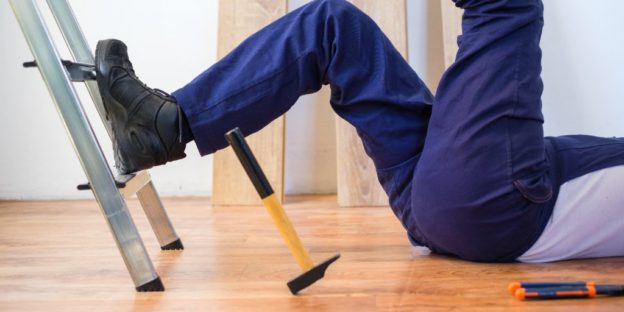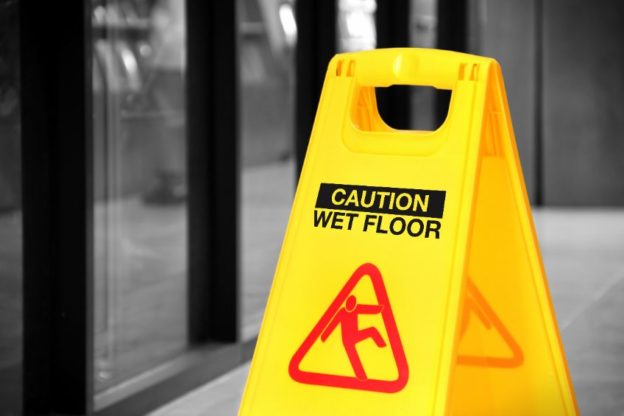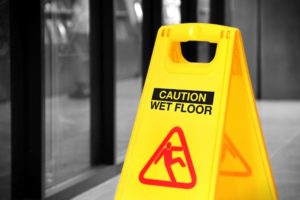In this guide, we’ll be discussing slips, trips and falls at work, and the process of making an accident at work claim after being injured as a result of negligence.
Every employer has a duty of care to their employees. We’ll discuss this legal obligation further down, but a breach in this duty of care can cause accidental injury.
If you have any more questions, or simply want to begin your claim, then you can use the below contact information to discuss this further with us. You could speak with someone our team of advisors, who can provide you with legal advice and eventually connect you with legal representation if your case is valid.
You can contact us by:
- Filling out your details in the contact us section of our website
- Use the number at the top of this page
- Use the live chat function to talk further with our team of advisors.

Slips, trips and falls at work claims guide
What Potential Compensation Could You Recieve From Slips, Trips And Falls At Work?
If you make a successful claim for the harm caused by an accident at work, then you could receive two different kinds of damages.
General damages compensation is a head of claim that aims to reimburse you for any suffering and pain you’ve experienced as a result of your injuries. The figures in the table below have been taken from the Judicial College Guidelines, which is a document used by solicitors to help assign a value to this head of your claim.
| Injury | Severity | Compensation | Notes |
|---|---|---|---|
| Neck Injuries | Severe (a) (i) | In the region of £148,330 | Neck injury resulting in incomplete paraplegia, where the person will have very little or no movement remaining in the neck. |
| Back Injuries | Severe (iii) | £38,780 to £69,730 | Cases resulting in continuous severe pain, impiared agility, depression, unemployability, and a prominent risk of arthritis. |
| Achilles Tendon | Serious (b) | £24,990 to £30,090 | Complete division injury has been repaired, but there is residual weakness limiting movement. |
| Foot Injuries | Moderate (f) | £24,990 to £39,200 | Continuing pain from traumatic arthritis, or risk of future arthritis. |
| Pelvis Injuries | Lesser (i) | £3,950 to £12,590 | Little or no lasting disability despite initial injury being significant. |
Note that the figures provided above aren’t guaranteed. This is due to the variety of variables that have to be considered when determining general damages.
Special Damages
You might also be entitled to special damages. This head of a claim aims to reimburse you for the financial impact that your injuries have had on your finances. For example, this could include:
- Lost earnings
- The cost of care and medical treatment
- Travel costs, for example to and from medical appointments
Eligibility When Claiming For Slips, Trips And Falls In The Workplace
At this point, you might be wondering “when can i make a workplace injury claim?” Regardless of where you work, your employer will always have a duty of care to their employees. This is a legal obligation that states how employers need to provide safe equipment, facilities, and environments for employees to work in safely, by taking reasonably practicable steps. This is outlined in The Health and Safety at Work etc. Act 1974.
When this isn’t provided, and an employee is injured as a result of this, then an accident at work claim may be able to be made. You should ensure that the incident is reported in the accident at work book so that a record is kept of it.
Examples Of Slips, Trips And Falls At Work
In order to understand when you can make an accident at work claim, below we have included some examples of negligence that results in slips, trips and falls at work:
- Falling from a height due to using faulty equipment that’s been provided by your employer.
- Slipping on a wet floor due to no warning signs being present
- Tripping on a floor due to loose cables
- Tripping on damaged stairs.
- Falling from a height due to scaffolding not being correctly erected.
In order to make a successful accident at work claim, you’ll have to provide sufficient evidence to prove that your injuries were caused by employer negligence. If you have any further questions about claims for slips, trips and falls at work, then you can contact us by using the information provided above.
Is There A Time Limit For A Work Injury Claim?
The standard accident at work claim time limit is three years from the date of your accident, or the date that you became aware that your injuries were a result of employer negligence. This is outlined in the Limitation Act 1980.
There are cases where you may be able to claim outside of the standard time limits set. In the case that a person is under the age of eighteen, or lacks the mental capacity to make a claim for themselves, then the courts can appoint a litigation friend to make a claim on their behalf and the time limit for claiming is frozen. In the case that they regain their mental capacity, or turn eighteen, then they’ll have three years from this date to begin their personal injury claim.
To find out more about the time limit that applies to slips, trips and falls at work, speak with a member of our team today.
Why Use Our Panel Of No Win No Fee Accident At Work Solicitors To Claim?
If you decide to use our solicitors to help you make a personal injury claim, then they could offer you a type of No Win No Fee agreement called a Conditional Fee Agreement (CFA). Under this type of agreement, you won’t be expected to make any upfront payments or any continuous payments as your personal injury claim is ongoing. In the case that your claim is unsuccessful, you won’t have to pay your solicitor for their services.
However, in the event that your claim is successful, you’ll have to pay a success fee. This is a legally capped, predetermined percentage deducted from your compensation total before it reaches you.
If you would like to know more about how No Win No Fee solicitors can help those claiming for slips, trips and falls at work, get in touch with our team.
Contact Us For Free To See If You Can Claim For An Accident At Work
You can talk with us at any time to get a free consultation in regard to your personal injury claim. Providing that you have a valid claim, our advisors may be able to put you in touch with one of the accident at work solicitors from our panel, who would be happy to assist you to the best of their ability whilst your claim is ongoing.
Get in touch with us by:
- Filling out your details in the contact us section of our website
- Use the number at the top of this page
- Use the live chat function to talk further with our team of advisors
Learn More About Claiming For Slips, Trips And Falls At Work
If you’d like to learn more about claiming for slips, trips and falls at work, then you can read more of our guides below:
Alternatively, you can follow the external links below:
Writer Louis Peach
Publisher Fern Summers







